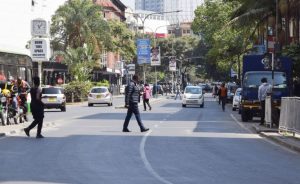Migrant returnees to Guinea describe ordeals faced

Tens of thousands of Africans are back in their home countries with help from the International Organization for Migration’s voluntary return programme.
Its funded by the European Union which is spending millions of dollars to deter migrants before they reach its shores.
The IOM programme pays for return flights and promises follow-up assistance.
But with few prospects in Guinea and his dreams of being a European soccer star dashed, 20-year-old Kabinet Kante says he feels abandoned.
He had tried to reach Europe, making the treacherous journey through Mali and Algeria, before finally spent two years in Tunisia attempting to make it there.
After attempting to cross the Mediterranean Sea, he was arrested by Tunisian authorities who took him with a group of migrants into the desert, leaving them stranded.
He said a Malian man they met on the road told them to follow the tracks in the sand left by a passing car to get back to Tunisia The group spent two weeks on the road getting back to Tunisia.
In July, desperate and out of options, Kante was returned to Guinea through the United Nations programme.
He says he’s given up his dream of playing soccer professionally, and just wants to make a living – a serious challenge in Guinea where decently paid jobs, even for those with degrees, are hard to come by.
Kante says his mental health has suffered, and the IOM hasn’t given him the support they promised.
“I went to declare that my liaison wasn’t taking my calls. They called him and put us in contact. I spoke to him. He said not to call him anymore and that he will call me. From that moment until now he has not called me,” says Kante.
He’s started posting on TikTok about his ordeal, and says he’s had several others reach out to him with similar experiences. A group of them now offer support to one another.
Oumar Bella Diallo, 24, made a similar journey through the Sahara desert. He ended up in Algeria, where a local man beat him, breaking his finger and left leg.
Without Algerian identity papers, he was unable to receive care in local hospitals, which he said turned him away. His leg healed incorrectly, and still causes him intense pain.
Once returned to Guinea, also through IOM’s voluntary return programme, Diallo said he just wanted to get medical care for his leg.
But he says IOM staff told him they would be unable to help. Like many other migrants, Diallo just wants to make enough money to support his family.
But, he says, doing so in Guinea can feel impossible, with informal work earning around $50 a month.
“If you see the youth driving motorcycle taxis here, college graduates driving motorcycle taxis. It’s because if there were work opportunities in the country, everyone would do it,” he says.
The IOM says that over 90,000 voluntary returnees started, and 60,000 have completed, the reintegration process that’s “tailored to individual needs”.
It said the process can “support anything from housing, medical assistance or psychosocial services to business grants, vocational training, and job placement.”
No migrant the Associate Press spoke with said they had received any of these.
Elhadj Mohamed Diallo, director of the Guinean Organisation for the Fight against Irregular Migration, is a former migrant himself.
He says he got lucky getting work but is not sure how life would be for him if this wasn’t the case. Diallo helps Guineans reintegrate into society.
“We aren’t helping them so that they can stay. We are helping them so they can take control of their lives again,” he says.
By Rédaction Africanews



